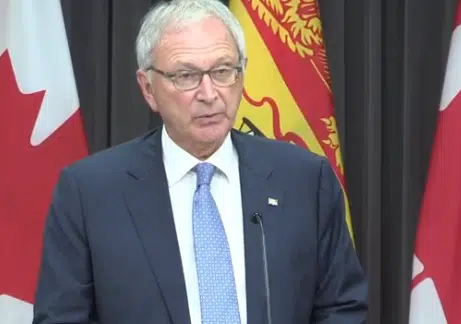
New Brunswick Premier Blaine Higgs addresses media during the Thursday, Oct. 8 COVID-19 provincial briefing, confirming masks will become mandatory in most indoor public places effective midnight Friday, October 9. (Source: GNB YouTube)
New Brunswick’s premier says masks will become mandatory in most indoor public places as of midnight Thursday night.
This includes retail businesses, malls, service centres, places of worship, restaurants and bars, except while eating. It also applies to organized indoor gatherings in public spaces, such as weddings and funerals.
Also included are common areas like lobbies, elevators and hallways, and public shared spaces including those in the private sector and government workspaces.
“Based upon what we are seeing in our neighbouring provinces and the outbreak in Moncton, we know how quickly the virus can spread through a community,” said Premier Blaine Higgs. “We must take every possible measure to prevent that from happening in our province.”
Children under two are exempt from wearing masks, as well as those with a medical condition that prevents them from wearing a mask.
Previously existing mask policies continue to apply in hospitals, health care settings, public schools and early childhood learning facilities.
“Based upon what we are seeing in our neighbouring provinces and the outbreak in Moncton, we know how quickly the virus can spread through a community,” said Premier Blaine Higgs. “We must take every possible measure to prevent that from happening in our province.”
Higgs also spoke of what he described as “too many people not wearing their masks when required, recognizing the change as “a major announcement and businesses and individuals may need time to adjust.”
Inspection and enforcement officers from the Department of Justice and Public Safety surveyed 600 public spaces across the province and estimated the average number of people wearing masks is 36 per cent.
“We are asking for people to comply immediately,” spoke Higgs, “Peace officers will be monitoring to ensure people are wearing masks as required.”
Three New Cases
Thursday’s update comes as the province’s chief medical officer of health also announced three new cases of COVID-19, spanning three health zones.
Dr. Jennifer Russell added the cases are not linked to an outbreak at the Manoir Notre-Dame special care home in Moncton.
Russell said two of the cases are related to travel outside of Atlantic Canada — one person in their 40s in the Saint John region and one person in their 20s in the Fredericton region.
The third case, a person in their 30s in the Campbellton region, remains under investigation.
The province now has 24 active cases of COVID-19, including 19 cases linked to the outbreak in Moncton.
Russell also announced that visitors are now prohibited at all long-term care facilities in the Moncton region until further notice.
Thursday’s update also confirmed that continuous mask use would still be required in seated venues with one-metre physical distancing to be maintained.
Possible Exposure On Two Flights
Health officials have identified a positive case in a traveller who may have been infectious on two flights.
They include Air Canada flight 418 from Toronto to Montreal and Air Canada flight 8792 from Montreal to Saint John on Oct. 4.
Anyone who travelled on these flights should self-monitor for symptoms for 14 days after the flight. They are directed to self-isolate and take the self-assessment online or call 811 to get tested should any COVID-19 symptoms develop.
Changes To Travel Restrictions
The province has also suspended a twinning agreement which allowed for non-essential day trips by residents of Listuguj First Nation and Pointe-a-la-Croix, Quebec.
Residents can still enter New Brunswick to get groceries, prescriptions and essential goods not available to them in their own community, just like they could before the agreement.
Travel is also still allowed for work, medical appointments, to fulfill the terms of a child custody agreement and to obtain child care.
Students can continue to cross the border to attend school for kindergarten to Grade 8. Arrangements are being made to provide remote learning for high school students starting Oct. 13.
With files from Christina Mulherin.







